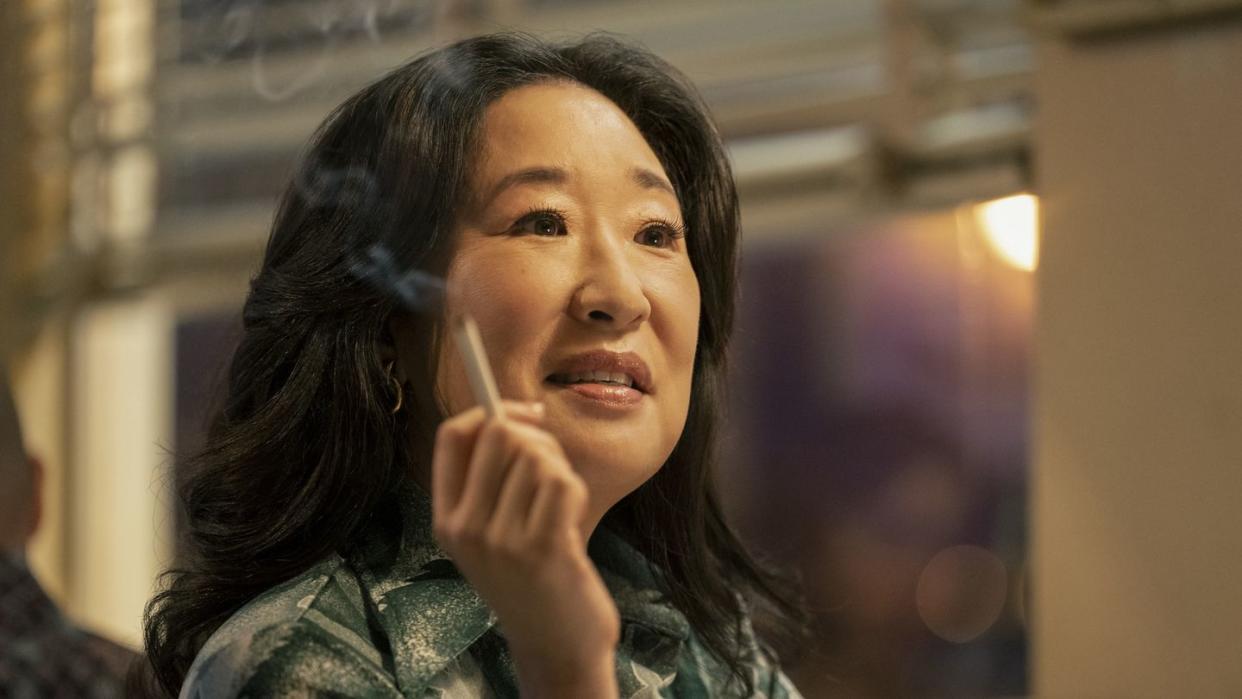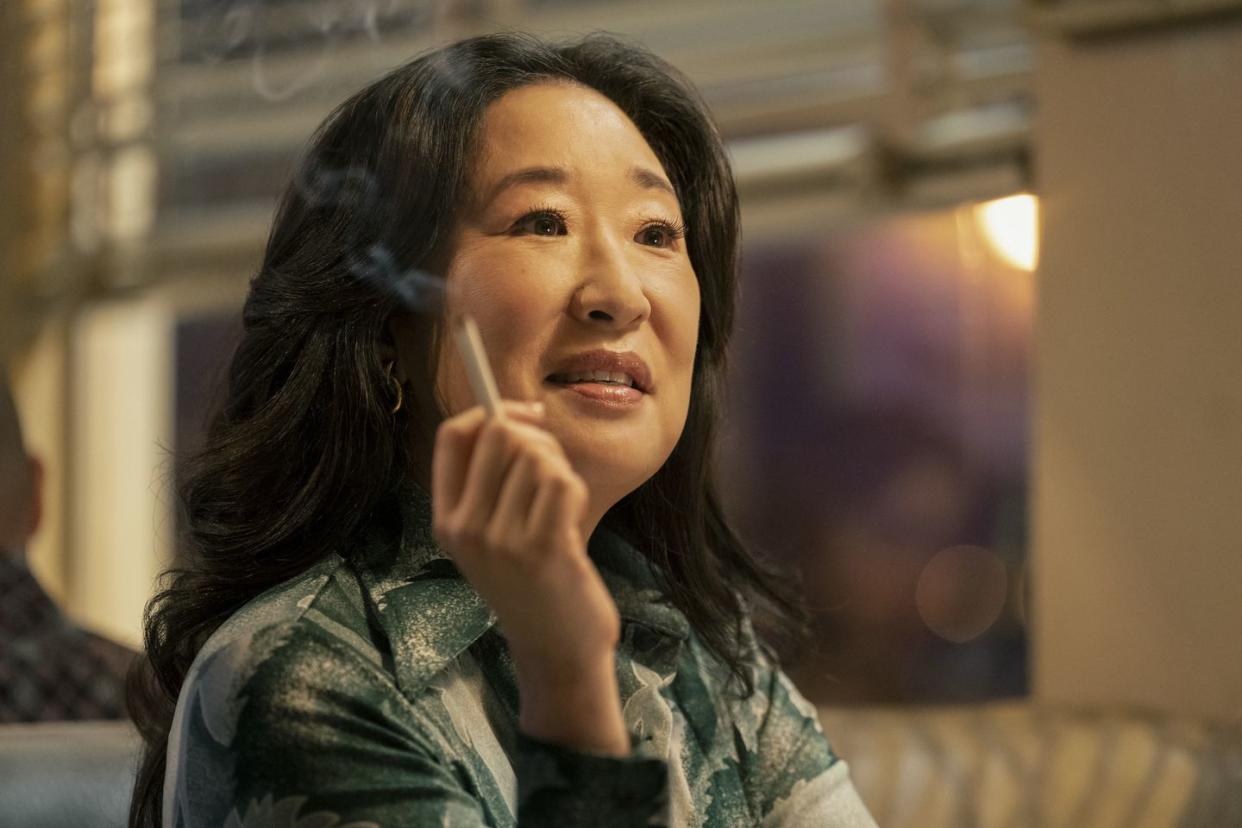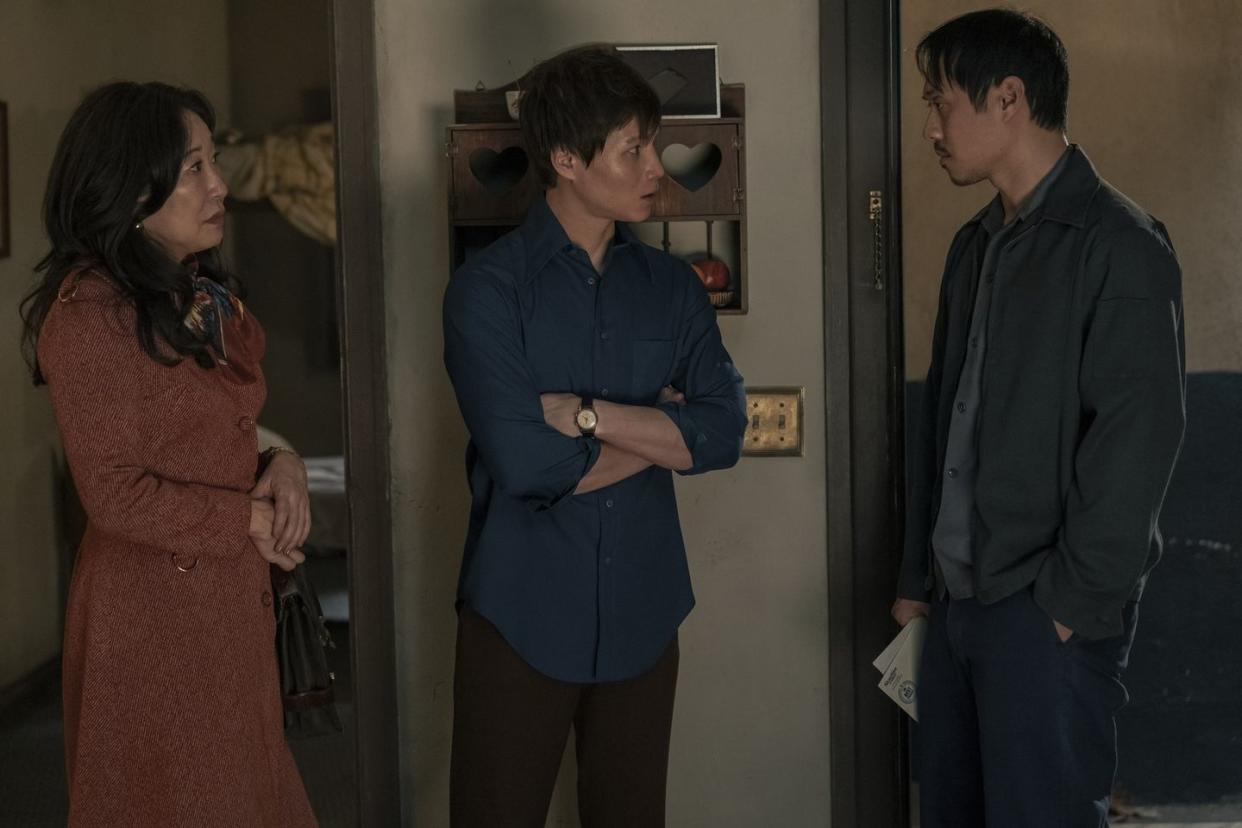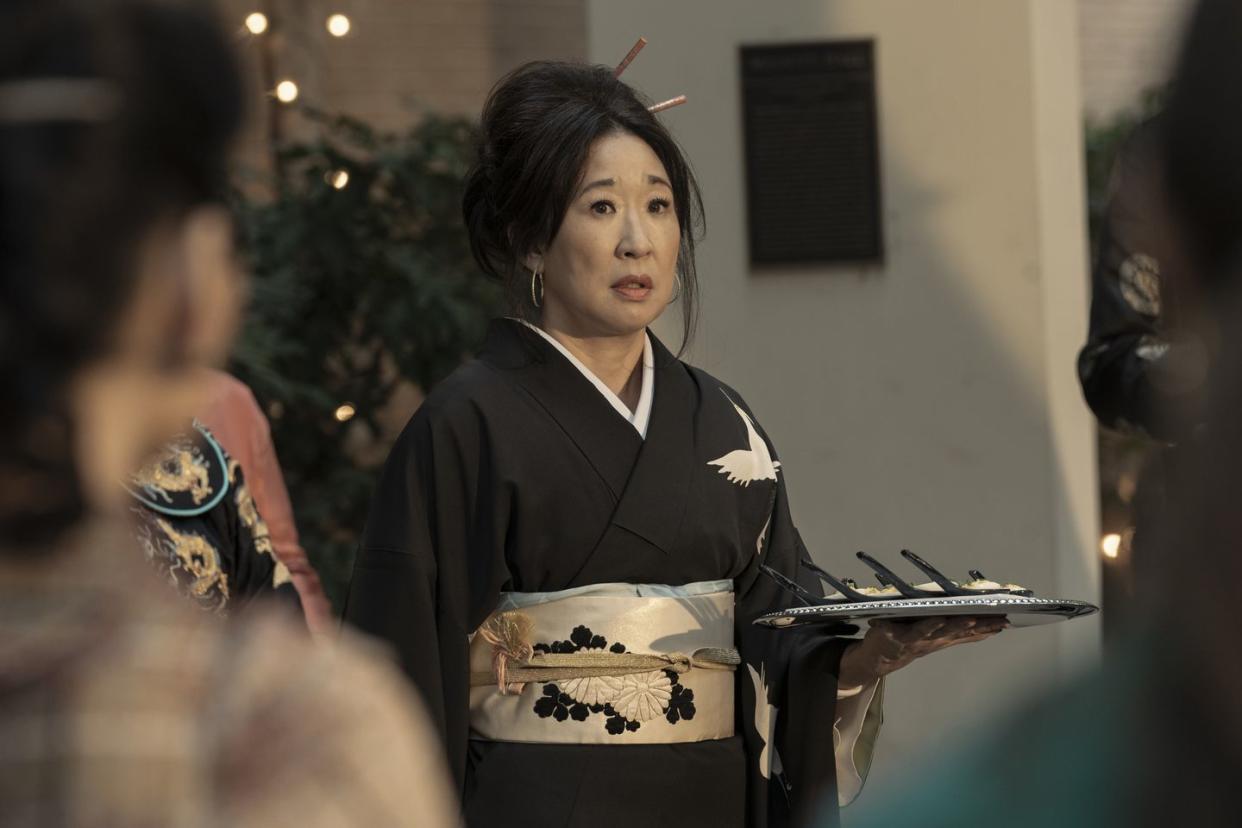Sandra Oh and Hoa Xuande Recall the Thoughtful Speech She Gave on the 'Sympathizer' Set

Spoilers below for The Sympathizer.
“In America, it’s called the Vietnam War. In Vietnam, it’s called the American War,” reads an opening title card on the first episode of HBO’s new limited series The Sympathizer. It’s an immediate reminder to Western audiences of the perspectives on global conflicts outside of their own, and teases that this series, based on the Pulitzer Prize-winning novel by Viet Thanh Nguyen, will challenge that long-held American (and Hollywood) mythology. Set just prior to and immediately after the Fall of Saigon in 1975, Hoa Xuande stars as The Captain, a South Vietnamese official who is secretly an undercover agent for North Vietnam’s Communist regime. After barely making it out of the country as the capital fell, The Captain lands in Los Angeles—where he previously attended college—and continues to aid the Communist efforts from afar as a mole embedded with the Southern General.
The Captain’s life is one of dualities: he is half-Vietnamese and half-French, and his white blood puts a target on his back within the Asian community. He is torn between the two warring factions of his home country, embodied by his two best friends, one of whom is a staunch Southern soldier and the other is a Communist revolutionary. When he meets Ms. Mori (Sandra Oh in a crackling comedic performance) in the second episode, a colleague at the college whom he soon begins sleeping with, The Captain is forced to reckon with his own assimilation and Asian identity.
Xuande and Oh’s chemistry is palpable from the moment they shoot knowing glances at each other early in “Good Little Asian” (episode 2) when their Asian-fetishizing professor (played with camp by Robert Downey Jr. in one of his four roles in the series) makes one of many problematic statements. “[We knew] how to play tennis,” Oh tells ELLE.com about her immediate chemistry with Xuande. In a Zoom interview, the co-stars dish about crafting their complex roles, how The Sympathizer speaks to Asian-American identity, and Oh’s on-set speech to the predominantly Asian cast and crew during the shoot.
What were the biggest challenges for you in crafting your performances?
Hoa Xuande: It was basically a guy who was having a massive identity crisis: being a double-agent, having conflicting sides to play, and tests of loyalties to his friends and to people he’s working for. I found that challenging in the way that there’s only so much I can relate to in my own personal life. I could use [my identity] as a Vietnamese person growing up in Australian society, but the challenge of stepping into a person’s shoes and having to navigate so many different things—from love to loyalty to belief to ideology to sacrifice to doing the right thing, whatever that means—I had to slowly navigate myself through the scenes presented to me and trust what my core psychological beliefs about how the character would navigate those situations.
Sandra Oh: It’s not obvious or spelled out. But when you get deeper into the series, then you start to really see what The Captain is not able to feel himself and you’re really seeing where The Captain’s motivations are coming from.

The show pulls from such a rich text of the novel. How much did you both rely on the book versus create a new persona?
Xuande: I tried to align my development of my character as closely as I could to how Viet [Thanh Nguyen] describes The Captain. The satirical, humorous, devastating, tragic nature of The Captain—it’s all written there on the page. To not really lean into that would be a mistake. But there’s only so much that you can do as an actor, and then you have to find your own inspirations. The first things I really wanted to tackle were the emotional and psychological aspects. I did a lot of my own personal research about the time period, and found anecdotes and stories of Vietnamese people that lived during the time, and read about their beliefs, what they thought of the conflict, and how they dealt with the post-war period. Once I’d found that core set of beliefs, I laid on the relationships I had with all the characters, like his friends in Bon (played by Fred Nguyen Khan) and Man (played by Duy Nguyễn), and then having relationships like the one with Ms. Mori. It’s so beautifully articulated in the book, but [I still had to find] that depth of how I react to everyone with my own core beliefs.
Oh: Ms. Mori is in the book and that’s the first layer of it. I would say a lot had to do with the chemistry between The Captain and Ms. Mori. When Hoa and I met, sparks flew. Hoa is a very open actor and so willing. I felt that we found our chemistry fairly quickly.
Speaking of chemistry, your characters seem to be immediately comfortable with one another. How did you two build that?
Oh: I wish we had more time, but ultimately we didn’t need it. For me as an actor, chemistry is about being able to listen. You’re able to listen, you’re able to follow and you know how to play tennis. You know how to dance. Hoa is in, I think, every single scene of the show so he didn’t have any time to kind of hang out. So it was just about being an open and willing fellow actor to really listen and be willing to dance.
Xuande: Sandra was so warm and lovely and generous, and was open to my nervousness. We connected on a warm level that is almost imitating what it was like for The Captain to meet Ms. Mori for the first time.
Oh: Their relationship is intriguing. I feel like Hoa and I are very warm with each other, but The Captain and Ms. Mori have a lot of sparks. She’s constantly searching to crack him open, and he just won’t give it—and he’s also not able to give it, and you’ll see throughout the series where that leads their relationship.
Xuande: I love that Sandra described him as this closed person unable to reveal himself at times. But at the same time, The Captain looks at Ms. Mori as someone who’s so free-spirited and in control of her sexuality. She’s so liberated and able to express and do whatever she wants to do, and that’s such a beacon for The Captain.

There are a few moments in the second episode about Asian identity, especially as it pertains to the Western gaze. The Captain’s interview with a white student journalist points out that North and South Vietnam were on opposite sides of the conflict, while Ms. Mori makes it a point to say she’s from California when a fellow professor tries to paint her as exotic. Did this commentary feel prescient to you, as the idea of Asians as a monolith still exists in American society today?
Xuande: The depiction of the Vietnam War that we’re so used to seeing is of the Americans coming in to save the Vietnamese people from themselves. Throughout history, when we talk about the Vietnam War, it’s always been through that lens. On The Sympathizer, when a student journalist comes in to interview The Captain and says that the Americans were apparently on the side of the Vietnamese people, but he’s not able to distinguish that there were actually sides within that conflict and complexity of beliefs and ideas and a multitude of different Vietnamese people’s experiences is very telling of how the narrative of the Vietnam War has been very one-sided, very Western-centric for such a long time.
Oh: Ms. Mori says, “I’m from Gardena” and later says to the Captain, “I’m American.” I think that answer is so complex because the reason she uses those words is, in part, a defense for assimilation. We have been othered so much that she needs to state that she is “of the same” because she was born in Gardena. But throughout the series, you can track how Ms. Mori starts questioning the monolith of what it is to be American. When she states, “I am American,” I think she’s also denying her Asianness and her Japanese heritage. It’s a complicated statement because she's not right, but I understand why she’s saying that. It is of the time to say, “I have a right to be here. I am also not the same as The Captain,” because The Captain is a refugee. She’s trying to distance herself by explaining where she’s born.
The Captain has an incisive monologue about his half-Asian and half-white identity, which I feel can be extrapolated to the immigrant experience in general: We’re always either too much or too little. Did either of you connect to that sentiment at all?
Xuande: Particularly in that scene, what I’ve inferred is that Robert [Downey Jr.]’s Professor Hammer represents the cultural or educational establishment in the way that they have usually identified Asians or “the Oriental experience.” To be able to start asking The Captain to break down his oriental and occidental sides, he’s basically saying that these are the tropes that pertain to this or that side. And this is exclusively what they are. It’s almost like having these tropes being taught back to us as our identities and not allowing people who actually have these identities learn about themselves or express themselves fully.
Oh: I also feel that that monologue is very sly. The Captain is performing in some ways for the professor who said, “Reduce yourself to a list of east and west.” He is performing for the professor, but I feel like Ms. Mori is picking up on the slyness of it. She knows he’s performing and that he’s been asked to reduce himself to a bunch of adjectives, but for her it’s like, “Oh, good for you.” Because he’s talking to Ms. Mori in a coded way.

This was an international and diverse production. What was it like being on set with a predominantly-Asian cast and crew?
Xuande: Like I mentioned earlier, when we watch movies about the Vietnam War, it’s always been very Western-centric lens, from an American perspective, or even about the Americans coming in and saving the Vietnamese from the Communists. A lot of that ignores and flattens out the experiences of the people who actually experienced war in a multitude of different ways as profound as the American experience. To have Vietnamese cast members at the forefront of telling these stories about the Vietnam War, experiencing these traumas and devastations and the hilarity of it all gives a refreshing take. It adds a new perspective and validates a lot of these perspectives that have never really been seen before.
Oh: It was thrilling, I think, not only for us cast members but I hope for the crew as well. The crew, and all the way up into production and HBO and A24, was majority American. Here are a bunch of names that might not be familiar to you and there might have been times where people have not bothered to try to learn how to say it properly. And where have we moved now? I think it was an opportunity not only for the cast members, but for the crew members to be around three different Asian languages [Vietnamese, Korean, and Thai]. How does that expand non-Asian members of the cast and crew? I hope that it was enriching.
Xuande: I actually remember the fourth day filming, Sandra made a little announcement. I didn’t even realize you could do that, I was just trying to remember my lines to be honest. But Sandra just gave a short, sweet little speech saying, “Hey, guys, let’s just remember that we’ve got a very diverse cast and crew, different people from all types of backgrounds speaking a multitude of different languages. Let’s attempt to try and say people’s names the way that they want.”
Oh: It’s just to be able to give space to say, “To those members who have names that might not be as familiar to an American crew, forgive us for asking you 10 times how to pronounce it.” And for the crew members to make a respectful attempt to say, “I want to get right because I respect you.” It’s not about the convenience or inconvenience, it’s respecting a fellow crew member.
This interview has been edited for clarity.
You Might Also Like
